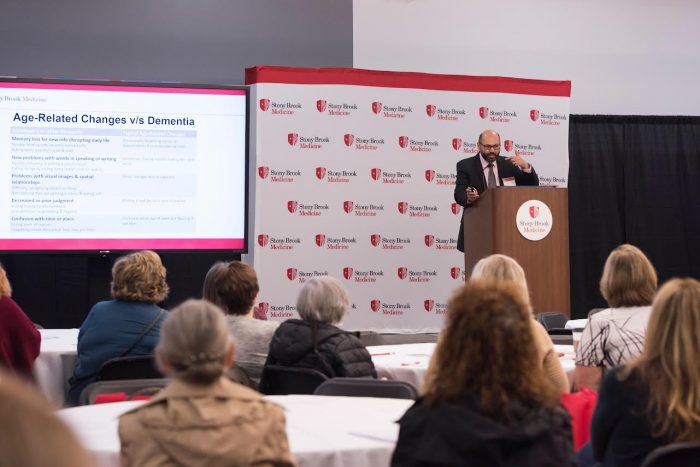Stony Brook Medicine awarded new $2.35 million state-funded grant to battle Alzheimer’s
Stony Brook Center of Excellence for Alzheimer’s Disease selected as the only recipient on Long Island, and one of only 10 NYSDOH-supported, hospital-based centers of its kind in New York State
Stony Brook Center of Excellence for Alzheimer’s Disease (CEAD) was awarded a new $2.35 million, state-funded grant over five years (2022-27 grant cycle) by the New York State Department of Health (NYSDOH) and renews on June 1. Of the 10 NYSDOH-supported, hospital-based centers in the state, Stony Brook Medicine is the only recipient of this competitive grant on Long Island and will continue to serve the growing needs of communities in both Nassau and Suffolk counties.
To qualify as a Center of Excellence for Alzheimer’s Disease, a hospital-based center must meet rigorous standards which are measured and reviewed annually. These include: high quality diagnostic and assessment services for people with Alzheimer’s or another type of dementia; patient management and care; referral of patients and their caregivers to community services; training and continuing education to medical professionals and students on the detection, diagnosis and treatment of Alzheimer’s and other forms of dementia.
With scientific strides being made in identifying potential new ways to diagnose, treat and prevent Alzheimer’s and other dementias, Stony Brook’s efforts during this five-year grant cycle will also include a continued focus on research.
“The renewal of this important NYSDOH grant comes at a time when there are a growing number of people with Alzheimer’s disease in our state, many of whom reside in underserved communities right here on Long Island,” said Harold Paz, MD, MS, Executive Vice President Health Sciences, Stony Brook University, and Chief Executive Officer, Stony Brook University Medicine. “It reinforces the strong reputation Stony Brook has built over the years, as an expert in diagnosis, care, training and resources, and as an institution committed to being at the forefront of research and clinical trials seeking effective treatments and a cure.”
A Growing Population of 65+
According to the DOH, 410,000 New Yorkers age 65 and older live with Alzheimer’s disease. By 2025, this number is expected to increase to 460,000 New Yorkers needing care for Alzheimer’s disease. Long Island has the second-highest age 65+ population in New York State after New York City. On Long Island’s East End, approximately 36 percent of homes have at least one person in the household who is over 65 years of age.
“We are honored once again to be recognized for all that our team and community partners have accomplished as we continue to serve this vulnerable population,” said Nikhil Palekar, MD, Director, Stony Brook Center of Excellence for Alzheimer’s Disease. Dr. Palekar, who joined Stony Brook in 2017, has been instrumental in developing the Center’s mission and services.
An expert in the treatment and research of cognitive and mood disorders in older adults with grant funding from National Institutes of Health (NIH), the Alzheimer’s Association and Alzheimer’s Foundation of America, Dr. Palekar encourages people who are having trouble remembering, learning new things, concentrating, or making decisions to get screened and diagnosed — the sooner the better. “When the brain is unable to function well, your entire health starts to suffer. If you’re having memory issues, you’re probably forgetting to take your medications for blood pressure, diabetes, high cholesterol, causing a worsening of chronic medical conditions,” he noted.
Cognitive Screenings, Clinical Trials, Federally Qualified Health Center Partnerships
The Stony Brook Center of Excellence for Alzheimer’s Disease, part of the Stony Brook Neurosciences Institute, now offers free cognitive screening clinics to the community at CEAD’s offices at Putnam Hall on the campus of Stony Brook University, as well as at Stony Brook’s Advanced Specialty Care location in Commack. The Stony Brook CEAD staff is also available to conduct free screenings in communities on Long Island upon request. Each individual screened will receive the screening results on the spot so that they can bring the results to their primary care physician for further assessment and treatment if needed.
The Stony Brook Center of Excellence for Alzheimer’s Disease also offers a variety of clinical trials in support of groundbreaking research studies on aging, memory, and dementia. Stony Brook has been selected as a study site for several clinical trials, including monoclonal antibody therapy trials that target amyloid plaque for the treatment of mild Alzheimer’s disease.
Another new initiative of the Stony Brook CEAD is the establishment of partnerships with several federally qualified health centers (FQHCs) on Long Island to help meet the needs of unserved and underserved people spanning communities from the east end to those bordering Queens. Stony Brook CEAD will provide free cognitive screening assessments, educational resources, training for physicians, and opportunities to participate in research studies and clinical trials, which will help improve early diagnosis and quality of life for people in these communities living with Alzheimer’s or other forms of dementia.
For more information about the Stony Brook Center of Excellence for Alzheimer’s Disease, visit ceadlongisland.org.
About the Stony Brook Neurosciences Institute:
Stony Brook Neurosciences Institute is the regional leader in diagnosing and treating a full range of brain, neurological and psychiatric disorders in adults and children. As a tertiary care center, we also serve as the “go-to” medical facility for community physicians and other specialists in the region who have complicated cases and seek advanced care for their patients. We bring the expertise of renowned specialists together with the use of sophisticated technology to deliver high-quality, disease-specific, comprehensive care for patients, while providing peace of mind to their families. This care includes access to various resources and therapies to assist with rehabilitation and reintegration into everyday living during and after treatment. The Institute features more than 15 specialty centers and programs — several that are unique to our region — and more than 70 research laboratories dedicated to the study of various neurological and psychiatric disorders and diseases. The Institute also provides challenging yet supportive educational experiences that prepare graduates to practice in a variety of clinical and academic settings. To learn more, visit www.neuro.stonybrookmedicine.







